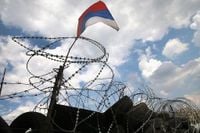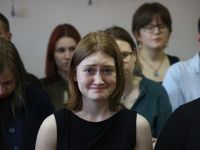On April 18, 2025, a court in St. Petersburg sentenced 19-year-old Darya Kozyreva to two years and eight months in a penal colony for allegedly "discrediting" the Russian army. This sentence follows her arrest on February 24, 2024, after she affixed a verse from Ukrainian poet Taras Shevchenko’s "My Testament" to his statue in St. Petersburg. The excerpt read: "Oh bury me, then rise ye up / And break your heavy chains / And water with the tyrants’ blood / The freedom you have gained," highlighting her protest against the ongoing war in Ukraine.
Kozyreva's legal troubles didn’t end there. A second case was filed against her in August 2024 after she gave an interview to Radio Free Europe in which she labeled Russia’s actions in Ukraine as "monstrous" and "criminal." During one of her court hearings, she defended her actions, stating, "I merely recited a poem and pasted a quote in Ukrainian, nothing more," according to the press service of the St. Petersburg courts.
Despite her defense, prosecutors sought a six-year sentence, arguing that her actions constituted repeated discreditation of the Russian military. In her final statement, Kozyreva expressed her unwavering belief in Ukraine's eventual victory, saying, "The national flag still flies over Kyiv, and it always will. I still dream that Ukraine will reclaim every inch of its territory: Donbas, Crimea, all of it. And I believe that one day, it will. History will judge, and judge fairly. But Ukraine has already won. It has won. That’s all." This poignant declaration underscores her commitment to her homeland and her opposition to the war.
Kozyreva's activism is not new. OVD-Info, a Russian human rights group, reported that she was previously detained in December 2022 while still in high school for writing, "Murderers, you bombed it. Judases," on a city installation that honored the twinning of St. Petersburg with the Ukrainian city of Mariupol, which had suffered devastating attacks during the war. Following this incident, she was fined for "discrediting" the army and expelled from university for a post discussing the "imperialist nature of the war," according to Memorial, another prominent human rights organization that has recognized her as a political prisoner.
Amnesty International’s Russia Director Natalia Zviagina condemned the court's ruling, stating, "Daria Kozyreva is being punished for quoting a classic of 19th-century Ukrainian poetry, for speaking out against an unjust war and for refusing to stay silent. We demand the immediate and unconditional release of Daria Kozyreva and everyone imprisoned under 'war censorship laws.'" This sentiment is echoed by many human rights advocates who view her case as indicative of the broader crackdown on dissent in Russia.
Kozyreva is among a growing number of individuals targeted for their anti-war sentiments. OVD-Info reports that more than 1,500 people are currently imprisoned in Russia on political grounds, with over 20,000 detained for anti-war views since the full-scale invasion of Ukraine began in February 2022. The Russian government's efforts to suppress dissent have escalated significantly during this period, with numerous cases of individuals facing legal action for expressing their opposition to the war.
The case of Darya Kozyreva serves as a stark reminder of the risks faced by those who dare to speak out against the Russian government's military actions. Her sentencing not only reflects the personal cost of her activism but also highlights the broader climate of fear and repression that has taken hold in Russia since the onset of the war. As authorities continue to crack down on dissent, the plight of activists like Kozyreva becomes emblematic of the struggle for freedom of expression in a country where such rights are increasingly under threat.
In a society where dissenting voices are systematically silenced, the courage displayed by young activists like Darya Kozyreva stands out. Her commitment to speaking the truth and advocating for her beliefs, despite the severe consequences, resonates with many who yearn for a more just and free world. As her case unfolds, it remains to be seen how the international community will respond to such blatant violations of human rights and the suppression of free speech in Russia.
Kozyreva's story is not just about her personal struggle; it reflects a larger narrative of resistance against oppression. The ongoing war in Ukraine has galvanized many young people in Russia to voice their opposition, often at great personal risk. The future of such activism remains uncertain, but the resolve of individuals like Kozyreva continues to inspire hope for change.
As the world watches, the case of Darya Kozyreva serves as a poignant reminder of the power of words and the importance of standing up for one’s beliefs, even in the face of overwhelming adversity. Her journey is a testament to the enduring spirit of those who seek justice and the right to express their views freely.






